

Facts v feelings: how to stop our emotions misleading us. By the spring of 2020, the high stakes involved in rigorous, timely and honest statistics had suddenly become all too clear.
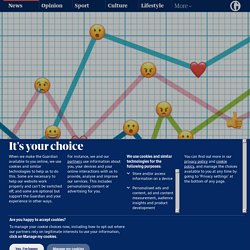
A new coronavirus was sweeping the world. Politicians had to make their most consequential decisions in decades, and fast. Many of those decisions depended on data detective work that epidemiologists, medical statisticians and economists were scrambling to conduct. Tens of millions of lives were potentially at risk. So were billions of people’s livelihoods. In early April, countries around the world were a couple of weeks into lockdown, global deaths passed 60,000, and it was far from clear how the story would unfold. An epidemiologist, John Ioannidis, wrote in mid-March that Covid-19 “might be a once-in-a-century evidence fiasco”. Reflection Models and Mindsets. Using Research in our School - Teaching Council. This webinar, which is just over one hour long, was first broadcast by the Teaching Council in January 2019 and was jointly hosted with the Junior Cycle for Teachers (JCT).
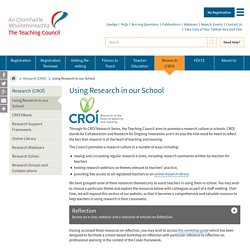
During the webinar the themes of reflective teaching and reflective learning were discussed by the panel members listed below. The discussion was chaired by the Teaching Council's Director, Tomás Ó Ruairc. You can access the recording of the webinar here. Panel Members Dr Padraig Kirk, Director of Junior Cycle for Teachers Professor (Emerita) Ruth Leitch, School of Social Sciences, Education and Social Work, Queen's University, Belfast Bernie Tobin, Deputy Principal at St.
Dr Conor Mellon, Seconded teacher currently working in the Teachers' Learning and Research section of the Teaching Council Anita McDonald, Post-Primary teacher at Ballybay Community College, Balybay, Co. Supporting Students to Reflect on their Group Work. To develop group skills, students need to do more than just complete group tasks.
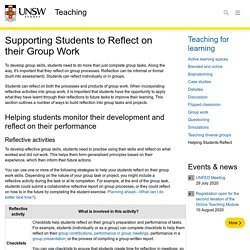
Along the way, it's important that they reflect on group processes. Reflection can be informal or formal (built into assessment). Students can reflect individually or in groups. Reflection – Assessment for Learning at King's. “It is not sufficient to have an experience in order to learn.
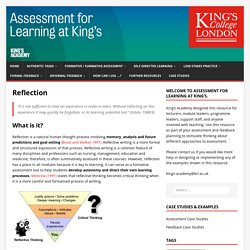
Without reflecting on this experience it may quickly be forgotten, or its learning potential lost.” (Gibbs, 1988:9) What is it? Reflection is a natural human thought process involving memory, analysis and future predictions and goal setting (Boud and Walker 1997). Reflective writing is a more formal and structured expression of that process. Image taken from Why would I use it? Known issues: Reflection can easily become a hoop-jumping exercise, especially when summatively assessed. DePaul University, Chicago. Sign out. Getting started with Reflective Practice. Reflective practice helps create confident teachers Reflective practice develops your ability to understand how your students learn and the best ways to teach them.
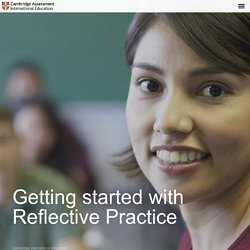
By reflecting on your teaching, you identify any barriers to learning that your students have. You then create lessons which reteach any content which your students have not been able to access to allow them to overcome any obstacles and develop. Being reflective will also make sure you have a wider range of skills as you find new ways to teach. This will develop your confidence in the classroom as you find the best ways to deliver your knowledge of a subject.
By reflecting, you will develop abilities to solve problems. Reflective Practice As A Space For Pre-Service Teachers To Engage With Critical Ideology Reflection. Benade, L. (2015). 'Teachers' Critical Reflective Practice in the Context of Twenty-first Century Learning', Open Review of Educational Research, 2(1), pp.42-54.
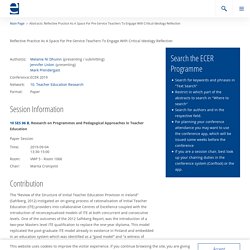
Brookfield, S. (2017). Becoming a Critically Reflective Teacher. San-Francisco: Jossey-Bass Bruster, B., & B. Peterson. 2013. Teacher mediation of curriculum making: the role of reflexivity: Journal of Curriculum Studies: Vol 0, No 0. This research explores curriculum making by teachers and offers a nuanced way of understanding these practices through the concept of reflexivity.
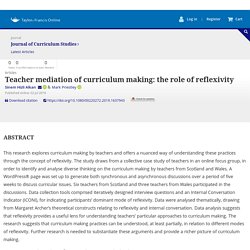
The study draws from a collective case study of teachers in an online focus group, in order to identify and analyse diverse thinking on the curriculum making by teachers from Scotland and Wales. A WordPress® page was set up to generate both synchronous and asynchronous discussions over a period of five weeks to discuss curricular issues. Six teachers from Scotland and three teachers from Wales participated in the discussions.
Data collection tools comprised iteratively designed interview questions and an Internal Conversation Indicator (ICONI), for indicating participants’ dominant mode of reflexivity. University of Cumbria. The following can be accessed from here - simply click on the title which interests you. 1) Reflective Teaching - A guide.
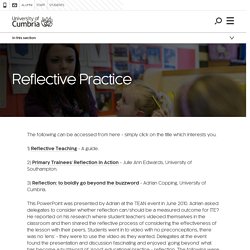
10 Metacognitive Prompts To Help Students Reflect On Their Learning - By TeachThought Staff & Peter Pappas It’s well-established that reflection is critical in the learning process.
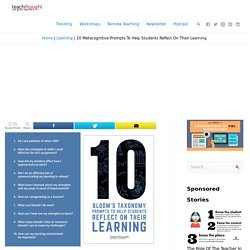
While it sounds formal, ‘reflection’ simply means to ‘think again’ about something that happened. Reflection is a natural part of learning and in many cases doesn’t even need to be ‘promoted.” Given time and collaboration, students (and adults) tend to talk about experiences and learn from that kind of reflection. Why this is true is a deeper diver, but it’s clear that when the brain ‘experiences’ something, it doesn’t necessarily ‘see it’ accurately.
ELECTRONIC JOURNAL OF RESEARCH IN EDUCATIONAL PSYCHOLOGY. Supporting collaborative reflection in teacher education: a case study: European Journal of Teacher Education: Vol 42, No 2. Experiences of care labour, gender and work for men who teach young children.